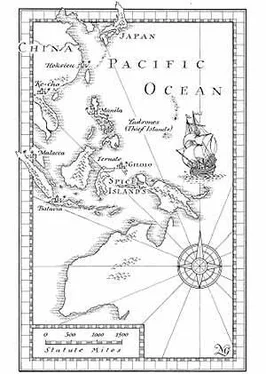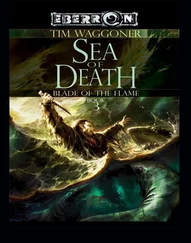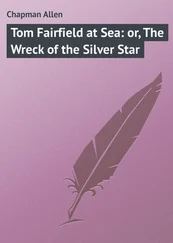‘I have never had a chance to cook with this before.’ He held out the root for Hector to smell. There was a scent of orange and ginger, and a hint of mustard.
‘Turmeric,’ the Frenchman announced happily. ‘It will give a peppery, earthy taste to my fricasse´es, and change the colour of the food. But I will not warn the crew in advance. I will enjoy seeing their faces when I serve them yellow gravy.’
He continued to rummage through the baskets and uncovered a cluster of round, green fruits, which looked as though they might be some sort of lemon. He bit into one, made a face and spat out the juice and skin. ‘Ugh! That’s sour enough to pucker an angel’s lips.’ Then he grinned. ‘But I know something that will take away the after-taste.’ He turned to an array of earthen jars standing upright in the sand. Each jar was wrapped in straw, its neck sealed with a cloth plug. Picking up one of the containers, Jacques pulled out the stopper and tipped a dribble of clear liquid into his mouth. He swilled the drink around before swallowing, and gave a contented smile.
‘I thought they had brought me jugs of water,’ he said, rolling his eyes theatrically. ‘But they kept on pointing at them and crying out something like “Awamori. Awamori” until I tried some. It is delicious. My guess is that it is some sort of alcohol made from rice. I have no idea how much you need to drink before you fall down, but doubtless the crew will soon find out.’
Stolck must have reported on his conversation with Panu to Eaton and Arianz, for the three men now came over to where Hector and Jacques stood.
‘Look’s as though we won’t starve on this island,’ Eaton said as he surveyed the villagers’ offerings.
Hector wondered to himself just how long the humble villagers could be so generous.
‘This could be all the extra food the villagers have in reserve,’ he said.
Eaton shrugged unconcernedly. ‘If we run short, we’ll find ways of extracting more. They’re a servile lot.’
Arianz rubbed his chin thoughtfully. ‘We could put them to work for us.’
Eaton looked at him questioningly.
‘They’re fishermen, aren’t they?’ said the quartermaster.
‘They don’t seem to be doing much fishing at the moment,’ grunted Eaton.
‘Quite so. If they are idle, why don’t we have them make new sails for us? Stolck says their headman offered to provide anything we needed. We should ask him to supply some cloth, and then we can set his people to cutting and stitching.’
Eaton allowed himself a bleak grin. ‘The men will like that. It’ll take a few days to sort out our sails, and that should give us plenty of time to discover if there’s any gold to be found in this place.’
Hector felt he had to speak up. ‘But the headman asked us to depart as soon as possible. That’s why he and his people are being so helpful’
‘No need for us to dance to his tune,’ Eaton retorted callously. ‘We’ll leave when we want to.’

HECTOR WAS disheartened to see how accurately Eaton had judged the temper of his crew. After they had eaten the meal prepared by Jacques, they voted unanimously to spend at least a week on the island. With full stomachs they sat around in the sunshine, swilling the rice wine and luxuriating in the easy life on offer. Stolck was not alone in refusing to abandon the belief that the island would prove to be rich in bullion. Many of the men were still in the grip of gold fever, and there was much discussion about golden hair pins and the mysterious Ta-yin. The general conclusion was that the ‘chief man’ controlled the supply. The handful of gold trinkets worn by the villagers was only a hint of what could be obtained if they got their hands on the Ta-yin. All the world knew how Francisco Pizarro had succeeded in Peru by holding the Inca ruler to ransom until his people had filled an entire room with gold. The windbags and braggarts among the crew of the Nicholas grew increasingly tipsy on awamori and boasted that when the mysterious ‘big man’ showed up with his retinue, they would take him prisoner and not release him until they were paid a fortune in gold to go away.
Weary of such bombast, Hector wandered up the beach to get away from their grandiose talk. He found Panu, the interpreter, and Jeema seated unobtrusively in the shade of the bamboo thickets. They were watching over the campsite, and, from the troubled expressions on their faces, Hector guessed neither man was much impressed by the visitors.
‘Panu, can you ask Jeema why the villagers are not out fishing on such a calm day?’ he asked.
‘The Ta-yin stop us to launch our boats,’ answered the old man in his stilted Spanish.
‘But surely fishing is the village’s livelihood?’
‘Ta-yin punish us because we allow Ookooma go.’
‘Who’s Ookooma?’
There was an awkward pause. Then the old man answered, ‘The man you bring back from the sea.’
Hector had forgotten about their vanished castaway. No one had seen him since their arrival at the island.
‘Maybe it is better he die,’ added Panu softly.
Hector looked at the interpreter in astonishment. ‘But didn’t he have a family, a wife and children to feed and look after?’
‘His family feel same.’
‘I don’t understand,’ said Hector. He was perplexed by the stolid resignation in Panu’s tone.
‘For long time, the villagers not allowed to leave island.’
‘But Ookooma was near death when we picked him up. It looked as though he was adrift by accident.’
‘Yes, Ookooma was fishing. He good fisherman. That day he go too far and the sea take him away and boat broken. The sea takes him far away.’
‘So it wasn’t his fault.’
‘No matter,’ said Panu. ‘Ookooma not come home.’
‘But why should that result in a ban on the villagers using their boats?’
Panu gave a sigh. ‘The Ta-yin say whole village must pay Ookooma’s disappearance.’
Jeema must have guessed what was being discussed, for he said something and waited for Panu to translate.
‘Jeema say we must obey the Ta-yin and make sure others same.’
Hector shook his head in disbelief. ‘Where’s Ookooma now?’ he asked.
The old man merely stared at the ground, and would not answer.
NINE

THE DAYS PASSED, and Hector could see why Eaton and his men chose to ignore Jeema’s requests – repeated over and over again – that they leave the island. The anchorage was the ideal haven, where the crew of the Nicholas could recuperate after weeks at sea. Night and day the temperature scarcely varied, and the air was warm enough for the men to sleep on the beach in the open. Rain showers were rare and mostly fell in mid-afternoon. They lasted no more than ten minutes, and the men had no need to take shelter, knowing that the sun would soon reappear and dry out their clothes. By the end of the third day on the island the ship was entirely deserted and lay to double anchors, swinging gently to the regular variation of land and sea breezes. Her crew loafed about on land.
There was little for them to do and nowhere to go. In both directions the beach ended in tumbled masses of coral rock, so broken and jagged and overgrown as to be impassable. Behind the village Jeema showed Hector the terraces carved into the flank of a hill. They were for growing rice, while the middle slopes were planted with fruiting trees. Apart from the faint trace of a footpath leading through the orchards and then up into a thick pine forest that extended to the crest of the hill, the place seemed totally cut off from the outside world.
Читать дальше










